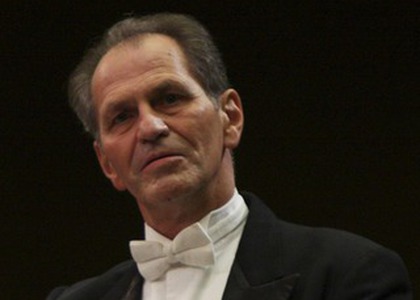> [Archived] Interviews

Interview with conductor Cristian Mandeal
Mr Cristian Mandeal, you return to the conductor's pulpit of the Radio Chamber Orchestra on Wednesday 26th of April. How would you describe your collaboration with the ensemble?
It is a very old and very good collaboration. We have done many concerts together in the recent years, about two per year, which for a guest conductor is a lot, and every reunion has been a great pleasure. I like this kind of music, the so-called chamber orchestra repertoire, which is a repertoire, I would say slightly elitist, in the best sense of the word. There are works that never appear in the programmes of the big symphony orchestras, because there is a managerial job involved, after all, because you have to give them all work, so to say so, and the repertoires of the big orchestras avoid such works with a small cast. Instead, the great pleasures happen here, in the chamber orchestra, where the repertoire is extremely refined and very rich in inner meanings. I would compare the chamber orchestra to a quartet. It has exactly the same valences, a little multiplied, but the problems, the inner richness, the individual participation of each individual in a chamber orchestra is very similar to that of a quartet.
Together with the ensemble you recorded the album "Serenity", recently released by Casa Radio Publishing House. On this disc you also featured a work by Wolfgang Amadeus Mozart. What do you think the impact of this music is, given that you are bringing a full Mozart programme to the concert on 26th of April?
If you ask me, I would love to conduct only Mozart for the rest of my life. It is so rich, so brilliant, that is the only word that can describe it, that any approach to Mozart's music is a celebration for any artist. The problem is to discover its inner richness, not to let oneself be taken in by the simplicity of a musical text which does not contain many interpretative indications, but which has its substance in its own inner unfolding of all the musical structures and gestures that Mozart's works in general contain. It's a joy to play Mozart, and of course we included the Serenade No. 12 on that disc, also due to the fact that the wind ensemble of the Radio Chamber Orchestra is not sufficiently exposed to the public and deserves to have a card that is worthy of its value.
The soloist will be violinist Alexandru Tomescu. How would you describe your collaboration with him?
Our collaboration has always been excellent. Alexandru is a mature artist, at the moment he is a superior violinist, I would say, in structure, in thinking and in achievement. I think he belongs to the group of great European soloists of the present. He lives in Romania and he does well, but of course it has its drawback, the price is not being sufficientlypublicised and known like a soloist who lives in another geographical and cultural area. I am personally very grateful that he chose to live in this country and contributes so substantially to the high value of local music.
Translated by Alina Burciu,
University of Bucharest, Faculty of Foreign Languages and Literatures, MTTLC, year II
Corrected by Silvia Petrescu














